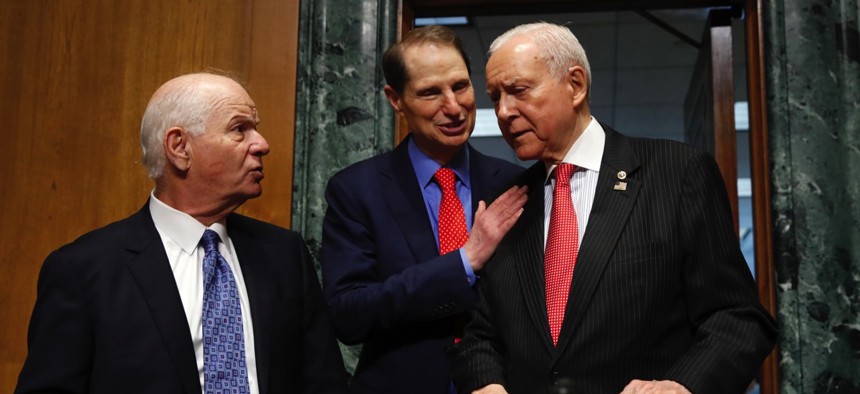CHIP Reauthorization Efforts Hit Partisan Roadblocks on Capitol Hill

Sen. Ben Cardin, left, talks with Ranking Member Sen. Ron Wyden, and Senate Finance Committee Chairman Orrin Hatch. (AP Photo/Jacquelyn Martin)
Fights over funding and amendments could further delay a process that has no time to spare.
WASHINGTON — Both the U.S. Senate and House bills to reauthorize the Children’s Health Insurance Program have cleared their respective committees.
The Senate bill advanced quickly through the Finance Committee with a voice vote with no additional amendments—an arrangement that was agreed upon in advance by members of that committee for the sake of expediency.
It has not yet been determined where the funding for that bill will come from. Republicans and Democrats are working together to determine financing mechanisms before the proposal goes to the Senate floor.
The House CHIP proposal passed through the Energy and Commerce Committee on a 28-23 party line vote, with the Democrats forming the opposition. Democratic representatives expressed their stringent disapproval not so much of the content of the plan—which like the Senate bill would fund CHIP for five years, and scale back the federal match rate to pre-Obamacare levels—but to the ways in which the measure would be financed.
The House Republican bill would be paid for in part by requiring older Americans with incomes in excess of $500,000 to pay a higher premium on their Medicare coverage. The House plan would also make it easier for states to disenroll lottery winners from their Medicaid plans.
"Here we are with a partisan bill that asks for coverage of children on the backs of seniors," said Rep. Diana DeGette during the hearing on Wednesday.
The partisan fight over funding could stall an already delayed process.
According to New Jersey Rep. Frank Pallone Jr., the senior Democrat on the Energy and Commerce Committee, the Republican CHIP funding proposals “will likely mean more delay and possibly no action in Congress until the end of the year as part of an omnibus appropriations bill.”
The negotiations have the potential to veer even farther off-course. Senate Minority Leader Chuck Schumer of New York has tossed around the idea of attaching a bipartisan Obamacare fix related to cost-sharing reductions being developed by Sens. Lamar Alexander, a Tennessee Republican, and Patty Murray, a Washington Democrat, to the CHIP funding bill. And, according to reporting from Morning Consult, Sen. Chuck Grassley, an Iowa Republican, is pushing GOP leadership to fold two pieces of legislation targeting rising prescription drug costs into the CHIP measure.
What's Happening at the State Level?
Of all the states, Minnesota is perhaps in the most dire situation when it comes to CHIP funding. According to Emily Piper, the commissioner for the state’s Department of Human Services, Minnesota’s CHIP money ran out the same day the program lapsed, on Sept. 30. Piper warned Congress that 1,700 pregnant women and as many as 200 infants under the age of two were at risk of losing their health coverage. On Tuesday, the state announced that they had received an emergency infusion of $3.6 million of federal cash redistributed from unspent national-level funds to keep the CHIP benefits of those populations secure.
Utah has filed an amendment to its CHIP plan, which covers 19,000 children, that would allow the state to eliminate some eligibility and benefits if it runs short on money to continue coverage. The state is home to Sen. Orrin Hatch, who was one of the program’s creators, along with the late Sen. Ted Kennedy. Utah is the first state to formally request permission from the federal government to wind down its program should Congress fail to renew funding before the year ends.
In August, officials in Nevada have said they anticipate their program will run out of funding by the end of November or the beginning of December. If a funding extension does not come, the would potentially freeze enrollment on Nov. 1 and terminate coverage on Nov. 30. To give families enough time to deal with these changes, officials would need to begin sending out notices of benefits changes to families starting now.
As many as 10 states project they will run out of funding by the end of December. Thirty-two states could see their funding run out as soon as the end of March, 2018. This map from the Kaiser Family Foundation shows how soon each state is projected to exhaust its funding:

Quinn Libson is a Staff Correspondent for Government Executive's Route Fifty based in Washington, D.C..
NEXT STORY: Election Officials Attacked From All Sides on Purging Voter Rolls






